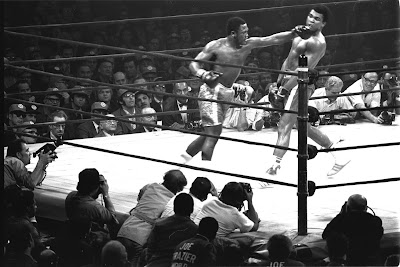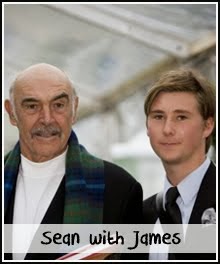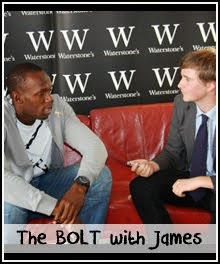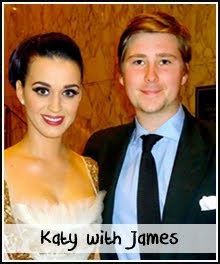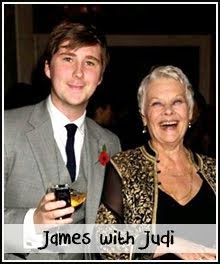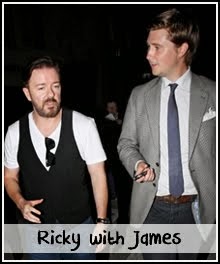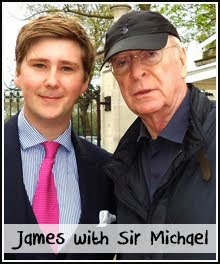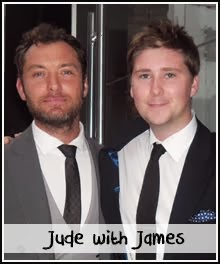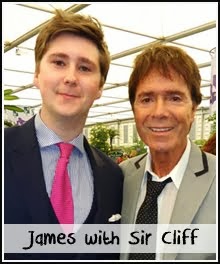James and Smokin' Joe
When boxing was bold, bright and glamorous and each fight was a ‘contender’ for hottest sporting event of the year, Joe Frazier, as Heavyweight Champion of the World, was King.
From 1970 to 1973, Smokin’ Joe reigned supreme and, with his career record standing at thirty-two wins (twenty-seven of which were from knockouts), four losses and one draw- not to mention an Olympic gold medal- Frazier leaves little question that he is one of the sport’s all time greats.Well-known, loved and revered as both a gentleman and a fierce competitor in the ring, his good-hearted nature and uncanny ability to make people laugh have always- according to those who know him best- been part of his colourful character.
James Davies went ten-rounds with the living legend to look back at his remarkable story.
Born in 1944, Joe Frazier, the youngest of eleven children, grew up in South Carolina. After his father Rubin, a sharecropper, lost his arm in a shooting accident, a young Joe became his close companion, running errands on the family farm and making Moonshine- “a potent type of alcohol”, he assured me- in the back woods.
As Joe came to the end of singing one of many songs during our chat, he explained: “I went everywhere with my father- we had a good time together. I learnt some good, some bad, but nothing ugly.
After a slight pause, Joe took a sip from his drink and mused: “I came from humble beginnings and saw how hard my mother and father worked and said to myself, one day I will get mom, dad and the whole family a new life. Fortunately the good Lord answered my prayers.”
Although it is easy to envisage a teenage Joe praying that one day he will become a boxing superstar, somewhat surprisingly he told me that nothing could be further from the truth. He says he became a boxer by accident, going to the gym to work himself into shape, not to become a prized fighter.
“My uncle Rock was the one who inspired me to become a boxer. In the old days the men would sit on the stoop, watching fight-night and drinking Moonshine. Children were not allowed to mingle with the adults, but I would always walk through to take a look. My father would say: ‘Billy-Boy what are you doing out here?’ But Uncle Rock would tell my father to leave me alone, saying, ‘Who knows, he might be the next Joe Louis!’”
With a wry smile, Joe joked: “I took it to heart!”
Determined to develop his skills in the ring, Joe, along with the cowboy hat he has worn for many years, left school and moved north. Aged just fifteen, Frazier settled with relatives in Philadelphia- a boxing Mecca.
Sitting back in his chair, looking rather relaxed, he explained: “I wanted to make sure I made something out of myself. I knew what I wanted to do. I just wanted to put those gloves on and be champion of the world one day.”
To pay the bills, Joe worked at a slaughter house, where he became the original ‘Rocky’, practising his jab against slabs of meat and staying in shape by running the streets of the city. “I used to run from where I lived to work really early in the morning- like four o’clock am!”
Smokin' Joe takes on Ali
As I began to ask him about the amateur fights that followed, Joe enthusiastically shouted, “Knock out, knock out, knock out!”, his way of explaining he won rather easily. It was here he began fighting competitively and became one of the world’s best amateur heavyweights, winning ‘The Golden Gloves’ three years in a row.
Joe did not lose until he ran into Buster Mathis, his sparring partner, in the all important 1964 Olympic trials. But when Mathis hurt his hand just before the Games, Joe took his place and flew the flag for the United States.
Like a child, Joe rather excitedly explained: “No one thought I could do it. There were like twelve boxers from America and everybody lost, besides me.”
In the Olympic semi-finals, Joe broke his left thumb. He kept the injury a secret from officials, going for the gold with a fractured fist.
“Had I told them, I would have been disqualified and I knew it was down to me to bring that gold medal back, as everyone else was out.”
Adding, after a brief chuckle, “I knew if I just hit him once, he’d be in trouble.”
Joe Frazier was an Olympic Champion. “It’s my proudest moment in boxing. I was fighting for the Championship of the World, not just America!”
After winning the gold medal, Joe returned to Philadelphia confident that his future was secure. But things were not that simple. “I had a gold medal round my neck but I still couldn’t get the proper management that I needed. They said I was too short and I was too small, and that big guys would just eat me up for breakfast, lunch and supper.”
Despite his success in Tokyo, Joe remained an afterthought.
But veteran trainer Yank Durham saw things differently. He and Joe went it alone in 1965. With Yank in his corner, Joe developed his signature style, and ran off eleven straight wins.
Like a locomotive train, Joe never stopped and it was for this reason, according to Joe, that they called him “Smoke”.
In September 1966, the Olympic Champion ran into tough guy Oscar Bonavena. The Argentine knocked-down Frazier twice in one round, but Smokin’ Joe came off the deck, showing his fans the heart and character that would mark his career, to win in the tenth round.
After Bonavena, Frazier knocked out contenders Doug Jones and George Chuvalo, ending the year with nineteen straight wins.
With Muhammad Ali’s exile from the sport, the Heavyweight division was in disarray. While the World Boxing Association (W.B.A) held an elimination tournament, Frazier was matched with his nemesis from his amateur days, Buster Mathis, for the New York State world title on March 4th , 1968.
This time Mathis was not able to dance his way to victory over three rounds. A relentless Frazier wore down the bigger, heavier man and the bout was stopped in the eleventh-round.
From 1968-70, Joe made six defences of his title, including a fifth-round knock-out of W.B.A champ Jimmy Ellis.
But in the summer of 1970, Ali was finally granted a license to fight and the demand quickly grew for a showdown between the former undefeated champ and the reigning king.
Now the two undefeated champions prepared for a battle like no other.
By the end of 1970, Ali knocked out top contenders Jerry Quarry and Bonavena, setting the stage for the most anticipated heavyweight title fight since the Louis-Conn rematch of 1946.
Frazier had befriended Ali during his exile, publicly supporting his right to fight and privately lending him money to survive. But once the bout was set, Ali cast himself as a symbol of ‘Black-Pride’ and Joe Frazier as an ‘Uncle Tom’.
When Ali began to humiliate Joe during the promotion of the fight, Joe felt brutally betrayed.
For the first time during the interview, Joe’s smile disappeared. “He was trying to make me afraid of him. I wasn’t afraid though.”
Nevertheless, Ali’s taunts tormented Frazier. “I would go to bed at night and all I could see was him. I would always wake up the next morning in a sweat because I had fought him all night long in my dreams.”
As the build up to the fight reached fever pitch, Joe’s family received a number of serious death threats.
Joe’s confidence seemed to drift for a moment: “I was worried for my family but that never stopped me thinking about the fight and how I would get the job done.”
On 8th March 1971, Joe Frazier fought Muhammad Ali in what would later be called ‘The Fight of the Century’, at Madison Square Garden with three-hundred million others tuning in from around the world.
Each fighter was paid the then unheard of sum of $2.5 million. The build up to the fight was unparalleled in boxing history; transcending the sport and the sporting world.
Before a sell-out crowd the two waged one of the greatest heavyweight battles ever. “I can still hear the roar that went up”.
That night Joe Frazier was about as good a fighter as anyone has ever been in the ring, defeating Ali in the fifteenth-round with perhaps the most famous left hook in history, catching Ali on the jaw and knocking out the former champ for a four-count.
Firing a jab towards my direction, Joe came alive. “He said before the fight ‘if I lose I will get on my hands and knees, crawl across the ring and say you are the greatest.’ He didn’t do that but I think he was too busy trying to get to the hospital.”
Joe Frazier had won ‘The Fight of the Century’, beating Ali, but his troubles were far from over.
The fight took a lot out of Joe, who did not fight again for the rest of the year. Having won the bout, Joe fiercely defended his title. To fellow fighters he seemed invincible.
But in January 1973, Joe lost to George Foreman and his reign as champion ended in Kingston, Jamaica.
Foreman knocked Frazier down six times before the fight was stopped in the second-round. “George was my hardest opponent. After the fourth knock-down I realised I was getting my butt whipped. He was tough because I couldn’t get out of the way of his punches!”
Although Joe had lost his Heavy-weight crown, he went on to beat Joe Bugner in his next fight, only to be beaten by Ali in their rematch in January 1974.
Although neither was a champ anymore, the bout was a sell out once again. “I was disappointed because I felt I won the fight. But at that time Ali was Ali and he couldn’t be beaten.”
Joe soon got back to winning ways, setting the stage for yet another highly anticipated dual with Ali, who had since lifted the title from Foreman.
In 1975, Frazier and Ali met for their third and final time, in a fight later coined The Thriller in Manila.
As fight night drew near, Ali let loose with another barrage of insults. For Ali all the taunting and name-calling was part of the game, but Joe couldn’t take it in that way.
Once again Joe’s smile slowly disappeared. “I had a lot of anger. I didn’t understand why he was doing it. We had all the contracts signed, we made all the money, the seats were filled. There was a lot of wrong stuff that went down.”
Joe, however, had more than just insults to worry about. High blood pressure and arthritis were breaking down his body while a cataract rendered his left eye all but blind.
“I knew I was going blind but I still had that dream of being the champion so I wasn’t going to stop.”
Frazier and Ali gave it all they had, battering each other round after round in the suffocating heat. The two ageing warriors duelled for fourteen rounds until a cut over Frazier’s good eye had left him nearly sightless in the ring. “I couldn’t see,” confessed Joe.
As the bout reached its climax both fighters were exhausted, but Frazier’s eyes were nearly swollen shut, and his corner stopped the fight.
‘The Thriller in Manila’ secured Joe Frazier’s legend.
Joe Frazier had fought his final championship round but his children vowed to re-capture the throne.
“The bad thing for my kids was that everyone and their sister wanted to beat them up because I was their Daddy. They had a rough deal but they managed.”
Joe’s son Hector and his daughter Jacqui would fight professionally but it was Marvis- the family Heavyweight- who followed directly in his father’s footsteps, despite Joe’s misgivings.
A confused looking Joe started to scratch his head as he said, “The kids had a great life. They all went to school and they were all smart, so I didn’t understand why they wanted to fight.”
As Marvis moved up the ranks of Heavyweight contenders, Joe moved into his corner. “Some people said I wanted him (Marvis) to fight like me. That’s right, I did, otherwise he wouldn’t be champion! (laughs)”
In 1983, Marvis got his wish and fought for the Heavyweight crown against Larry Holmes. The fight was stopped in the first round.
“How could I be mad?”, Frazier beamed. “I’d been there before. He tried his best.”
For forty years Joe Frazier has called the gym his home, explaining: “Wherever I’m at, wherever I am in the world, my gym is my home. I’m comfortable there.”
The life of a legend has not changed Joe’s routine. He still does the things he loved as a child- boxing, singing and tinkering with old cars.
Although his body and voice show the strains of age, Joe is still in the game, training local kids in a neighbourhood that has seen better days.
“It’s about community, it’s about touching lives, and it’s about changing lives. I think that kids appreciate it when they see someone who’s concerned about what they’re doing. If I turned my head and walked on, acting as though I don’t see, that’s wrong.
“I would say to the next generation of boxer, work hard, be true to your coaches and yourself. Something money can’t buy is love, time, loyalty, respect, integrity and honesty. I want for the young men and women what I achieved for myself! The secret to my success was my discipline, my hard work, and my faith in God!”
Their three classic battles have forever linked Joe Frazier and Muhammad Ali, but Joe’s bitterness from his insults lasted longer than the bruises from their fights. However in 2002, mutual friends brought the two legends together once again.
So when I asked Joe to sum up his relationship with Ali, he simply said: “We had some rugged years and some hard times but it’s all over man. It’s done, it’s gone.”


